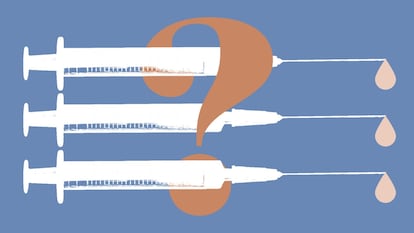Guide to the Covid-19 booster shot in Spain: Who is eligible and when will it be available?
Individuals who are aged 70 and over are first in line to receive a third vaccine dose, coinciding with the start of the annual flu campaign

After conducting one of the most successful Covid-19 vaccination campaigns in the world, Spain’s public health system is now preparing for a new challenge: administering a third dose to nearly seven million people in the 70-and-over age group. The effort will coincide with the annual flu shots, which mostly target the same age group.
According to Oxford University’s statistical repository Our World In Data, which makes it possible to compare vaccine coverage by country, Spain is the only one of the 50 most populous nations to have fully vaccinated nearly 80% of the population. Among neighboring countries, only Portugal (with a population of 10.3 million, ranking 90th globally) has a higher rate at 86%. The European Union average is 64%.
According to information released on Wednesday by the Spanish Health Ministry, 37,102,507 people, representing 88.1% of the target population (those who are 12 and over) have now been fully vaccinated. The 14-day cumulative case rate has grown slightly to 43 per 100,000 people, which is still within the low-risk scenario. The ministry also reported 31 new Covid-related fatalities yesterday, for an official death toll of 87,082 since the start of the pandemic. Also, 2,528 new infections were reported for a total of 4,993,295 since March 2020.
Many citizens are now wondering whether they are eligible for a booster shot, who the manufacturer is, and how it will be administered. The following are some frequently asked questions and their answers.
Who should get a third shot and when?
According to data from the Health Ministry, there are 6.9 million people in the 70-and-over age group living in Spain. Of these, 99.2% have been fully vaccinated. This entire segment of the population will soon start receiving appointments for a third shot – the southern region of Andalusia began sending out messages on Monday. Technically they are not the first, however: severely immunocompromised individuals have already received it. “It’s been decided to administer it to the over-70s because they are still a risk group,” said Antoni Trilla, head of preventive medicine at Clínic Hospital in Barcelona. “Also, because ageing typically causes a drop in antibody levels that makes them more exposed to infection. Although many of the over-70s remain protected against the most serious forms of the disease thanks to cell immunity, I usually say that a booster shot obviously boosts [immunity], and it’s important to reduce virus circulation among these groups.”
The Public Health Committee, made up of central and regional health authorities, has also discussed the possibility of extending the third dose to people over the age of 65, but no decision has been made yet. “For those under 65, or under 60 at the most, the available evidence shows that a third dose is not necessary for healthy individuals,” said Amós García, president of the Spanish Vaccinology Association (AEV).
In any case, the third dose should be administered at least six months after the second one, which means that practically everyone in the 70-and-over category is already eligible.
Which vaccine will be used for the third dose?
People who received messenger-RNA vaccines will get a similar booster shot. Most people in the 70-plus age group were given Pfizer-BioNTech and the European Medicines Agency (EMA) has authorized a third dose of this vaccine. A smaller group instead received Moderna during the original vaccination campaign, and the EMA has yet to issue a statement on whether a third dose of this brand is considered safe, although it is expected to do so in the coming days, just like the US Food and Drug Administration (FDA) did last week. The EMA did recommend a booster shot of Moderna for immunocompromised patients.
For an even smaller number of people in the 70-and-over group who were administered the single-dose Janssen vaccine, made by Johnson & Johnson, the situation is less clear. “It’s still undergoing review, although everything points to their receiving a second dose of a messenger-RNA vaccine, given the data and evidence that’s emerging,” said Amós García.
What steps need to be taken in order to get vaccinated?
None in particular. The system used in each region of Spain to reach out to residents about getting their first doses will be used again for the booster shot, according to sources consulted by this newspaper.
How will the third dose affect the information on the EU’s Covid pass?
The third dose will be registered, just like the first two, and reflected on the common certificate used across the European Union to prove the bearer has protection from Covid-19.
What if someone refuses to get the third dose?
“We don’t know whether acceptance will be as high as with the first two doses, although we have positive early data,” said Trilla. “For now they’re going to immunocompromised people, and all of them have showed up for their appointments.” This expert said that if enough individuals in the 70+ group reject a booster shot when the drive gets fully underway, health authorities will likely roll out awareness campaigns.
How long will the booster shot campaign last?
There are no specific deadlines, although it is expected that a majority of eligible people will receive their third dose before the end of the year.
Is it possible to get the third dose and the flu shot at the same time?
Yes, in fact it is recommended. “There’s no problem, according to all published studies. But you should get one in each arm,” jokes Amós García. “From a logistical point of view, the most reasonable thing is to get them together because you save time and trips, both for the patients and for the health professionals.” Although there are a few minor differences between the regions, flu shots will start to be administered in the second half of October.
Tu suscripción se está usando en otro dispositivo
¿Quieres añadir otro usuario a tu suscripción?
Si continúas leyendo en este dispositivo, no se podrá leer en el otro.
FlechaTu suscripción se está usando en otro dispositivo y solo puedes acceder a EL PAÍS desde un dispositivo a la vez.
Si quieres compartir tu cuenta, cambia tu suscripción a la modalidad Premium, así podrás añadir otro usuario. Cada uno accederá con su propia cuenta de email, lo que os permitirá personalizar vuestra experiencia en EL PAÍS.
¿Tienes una suscripción de empresa? Accede aquí para contratar más cuentas.
En el caso de no saber quién está usando tu cuenta, te recomendamos cambiar tu contraseña aquí.
Si decides continuar compartiendo tu cuenta, este mensaje se mostrará en tu dispositivo y en el de la otra persona que está usando tu cuenta de forma indefinida, afectando a tu experiencia de lectura. Puedes consultar aquí los términos y condiciones de la suscripción digital.









































